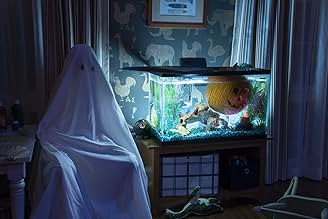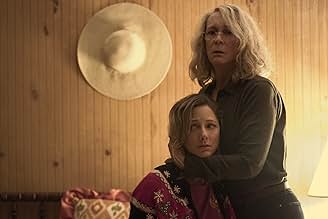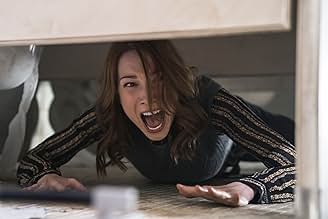Laurie Strode kommt zu ihrer letzten Konfrontation mit Michael Myers, der maskierten Figur, die sie verfolgt hat, seit sie in der Halloween-Nacht vor vier Jahrzehnten seinem Amoklauf nur kna... Alles lesenLaurie Strode kommt zu ihrer letzten Konfrontation mit Michael Myers, der maskierten Figur, die sie verfolgt hat, seit sie in der Halloween-Nacht vor vier Jahrzehnten seinem Amoklauf nur knapp entkommen ist.Laurie Strode kommt zu ihrer letzten Konfrontation mit Michael Myers, der maskierten Figur, die sie verfolgt hat, seit sie in der Halloween-Nacht vor vier Jahrzehnten seinem Amoklauf nur knapp entkommen ist.
- Auszeichnungen
- 4 Gewinne & 27 Nominierungen insgesamt
Michael 'Mick' Harrity
- Warden Kuneman
- (as Michael Harrity)
Ausgewählte Rezension
David Gordon Greene is an interesting director. He started out with micro-budgeted independent films like Undertow and George Washington before falling in with Danny McBride (and James Franco) for Pineapple Express. He made small to medium budgeted studio stoner comedies for a few years while occasionally making tiny movies here and there like Joe. He had a hand in Eastbound and Down and directed the second season of Vice-Principals where he apparently fell in love with Charleston, South Carolina as a filming location, for when he was given the reins to the Halloween franchise, he decided to recreate California acting like Illinois with Charleston. His history does not lend itself to the idea that horror would be his bag.
The first half hour of his Halloween is pretty much a straight drama with some brooding elements here and there. Laurie Strode's experience fighting Michael Myers in 1978 scarred her deeply to the point that she is a broken woman living on the outskirts of Haddonfield, Illinois on her bunker full of hiding spots, traps, and guns. Her daughter wants nothing to do with her, but Laurie's granddaughter feels that Laurie isn't getting the right level of appreciation from the family. There's a great scene where Laurie shows up to a family outing at a restaurant and just breaks down in front of everyone, including her granddaughter's boyfriend. It's uncomfortable and odd, but that's exactly what it's supposed to be. Not only has Laurie's experience broken her, but she's allowed it to completely dominate every aspect of her life. It's a sad sight.
Of course, the movie isn't a straight drama. It's a horror movie, and the horror comes from Michael Myers escaping from his prison and running loose again (any rumors of any other adventures between 2018 and 1978 are false). The introduction to Myers through a pair of investigative journalists, invited by Myers' doctor to try and elicit a reaction from the silent giant, is a wonderfully brooding piece of filmmaking. These three characters are consumed with the idea that there's something more to Michael Myers than simple evil, but Laurie warns them that they are wrong. It's a tad unclear (probably on purpose), but I think Myers' doctor organizes the killer's escape from the prison bus. He's expressed frustration in the idea that Myers has said nothing in forty years, and Myers is his life's work. He, essentially, knows as much about Myers after decades of study than when he began. He releases Michael so he can observe and study further, to understand Myers' beyond the silent killer.
But, of course, Laurie is right. Michael is just pure evil. And as the movie transitions from brooding drama about trauma into a horror movie, the film falters a bit. The middle section of the film is dancing around a few different tones that all clash together pretty harshly, undermining any real sense of impending danger. There is the central moment where Michael has a small rampage in Haddonfield's residential district, grabbing random weapons in one house and killing someone before simply moving on, that's right there, and it's great. However, it's surrounded by scenes that contain humor that, while oftentimes actually kind of funny, aren't placed in the greatest part of the movie and undermines the tension building. The last time this is a real problem is when we see two cops talking about Ban-Mi sandwiches. It simply doesn't work and stops a tension crescendo in its tracks.
After that moment, though, the movie goes full horror, and it's quite good. Perhaps some of the mechanics are a bit wonky to make it happen, but once there, the fight in and around Laurie's house is really effective tension and horror.
I read that Greene and McBride (one of the writers) were offered to film two Halloween movies back to back, but they turned it down because they wanted to figure out what they did right and wrong with the first movie before jumping into a second. Here's to hoping that if they do film a second film, that they work on getting a more effective and consistent tone.
The first half hour of his Halloween is pretty much a straight drama with some brooding elements here and there. Laurie Strode's experience fighting Michael Myers in 1978 scarred her deeply to the point that she is a broken woman living on the outskirts of Haddonfield, Illinois on her bunker full of hiding spots, traps, and guns. Her daughter wants nothing to do with her, but Laurie's granddaughter feels that Laurie isn't getting the right level of appreciation from the family. There's a great scene where Laurie shows up to a family outing at a restaurant and just breaks down in front of everyone, including her granddaughter's boyfriend. It's uncomfortable and odd, but that's exactly what it's supposed to be. Not only has Laurie's experience broken her, but she's allowed it to completely dominate every aspect of her life. It's a sad sight.
Of course, the movie isn't a straight drama. It's a horror movie, and the horror comes from Michael Myers escaping from his prison and running loose again (any rumors of any other adventures between 2018 and 1978 are false). The introduction to Myers through a pair of investigative journalists, invited by Myers' doctor to try and elicit a reaction from the silent giant, is a wonderfully brooding piece of filmmaking. These three characters are consumed with the idea that there's something more to Michael Myers than simple evil, but Laurie warns them that they are wrong. It's a tad unclear (probably on purpose), but I think Myers' doctor organizes the killer's escape from the prison bus. He's expressed frustration in the idea that Myers has said nothing in forty years, and Myers is his life's work. He, essentially, knows as much about Myers after decades of study than when he began. He releases Michael so he can observe and study further, to understand Myers' beyond the silent killer.
But, of course, Laurie is right. Michael is just pure evil. And as the movie transitions from brooding drama about trauma into a horror movie, the film falters a bit. The middle section of the film is dancing around a few different tones that all clash together pretty harshly, undermining any real sense of impending danger. There is the central moment where Michael has a small rampage in Haddonfield's residential district, grabbing random weapons in one house and killing someone before simply moving on, that's right there, and it's great. However, it's surrounded by scenes that contain humor that, while oftentimes actually kind of funny, aren't placed in the greatest part of the movie and undermines the tension building. The last time this is a real problem is when we see two cops talking about Ban-Mi sandwiches. It simply doesn't work and stops a tension crescendo in its tracks.
After that moment, though, the movie goes full horror, and it's quite good. Perhaps some of the mechanics are a bit wonky to make it happen, but once there, the fight in and around Laurie's house is really effective tension and horror.
I read that Greene and McBride (one of the writers) were offered to film two Halloween movies back to back, but they turned it down because they wanted to figure out what they did right and wrong with the first movie before jumping into a second. Here's to hoping that if they do film a second film, that they work on getting a more effective and consistent tone.
- davidmvining
- 21. Nov. 2019
- Permalink
Handlung
WUSSTEST DU SCHON:
- WissenswertesThe film's producer is Malek Akkad, who is the son of Moustapha Akkad, the producer of the original 1978 "Halloween." Moustapha Akkad was murdered, along with his daughter Rima (Malek's sister), in the terrorist bombing of an Amman, Jordan hotel in 2005. Jamie Lee Curtis has recounted how the first person she saw when she came to the set for the first day of filming the 2018 film was Malek, who she remembered as a 7 year-old child visiting the set during production of the original film. She added that seeing Malek for the first time since his father's death immediately brought her to tears.
- PatzerWhen Michael Myers walks around Laurie's house, the view from the basement shows gaps, dust and even his footsteps through the floor. Earlier the floor was shown to be consisting of square floor tiles without gaps.
- Zitate
Laurie Strode: Happy Halloween, Michael.
- Crazy CreditsThe opening and closing credits is stylized after the original 1978 version.
- VerbindungenEdited from Halloween - Die Nacht des Grauens (1978)
- SoundtracksTonight in the Moonlight
Performed by The Morrie Morrison Orchestra
Written by H.O. Morrie Morrison
Courtesy of Fervor Records
Top-Auswahl
Melde dich zum Bewerten an und greife auf die Watchlist für personalisierte Empfehlungen zu.
- How long is Halloween?Powered by Alexa
Details
- Erscheinungsdatum
- Herkunftsland
- Offizielle Standorte
- Sprache
- Auch bekannt als
- Halloween - Stelle dich deinem Schicksal
- Drehorte
- Produktionsfirmen
- Weitere beteiligte Unternehmen bei IMDbPro anzeigen
Box Office
- Budget
- 10.000.000 $ (geschätzt)
- Bruttoertrag in den USA und Kanada
- 159.342.015 $
- Eröffnungswochenende in den USA und in Kanada
- 76.221.545 $
- 21. Okt. 2018
- Weltweiter Bruttoertrag
- 259.939.869 $
- Laufzeit1 Stunde 46 Minuten
- Farbe
- Sound-Mix
- Seitenverhältnis
- 2.39 : 1
Zu dieser Seite beitragen
Bearbeitung vorschlagen oder fehlenden Inhalt hinzufügen











































